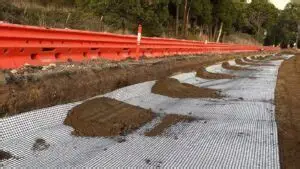Geo Textiles
Geogrids for Flexible Pavements (17371:2020)
Strategic Recommendations for Geogrids for Flexible Pavements
- Engage Early with BIS & Labs
Start BIS license application for IS 17371:2020 before the 1 Jan 2024 enforcement date. Arrange testing for tensile strength, junction efficiency, and durability at BIS-approved labs. - Partner with Compliance Experts
Collaborate with ERA compliance specialists to prepare documentation, testing plans, and ISI marking requirements. - Contact ERA Support Team
📧 cs@eraglobal.co.in | 📞 +91 9599296331 | 💬 WhatsApp
For BIS licensing, lab coordination, and export exemption guidance. - Track Notifications & Circulars
Subscribe to ERA Newsletter to receive updates on Geo Textiles (QCO), 2022, including S.O. 1706(E), S.O. 2331(E), and MoT enforcement orders. - Do a Gap Assessment
Review existing product specifications for aperture size, creep resistance, and junction strength to align with IS 17371:2020 compliance.

| Section | Details |
|---|---|
| Product Name | Geogrids for Flexible Pavements |
| IS Standard | IS 17373:2020 |
| Title of IS | Geosynthetics – Geogrids for Flexible Pavements – Specification |
| Quality Control Order | Geo Textiles (Quality Control) Order, 2022 |
| Notification & Amendments |
- Notified via S.O. 1706(E), dated 10 April 2023 - Amended via S.O. 2331(E), dated 24 May 2023 - Final enforcement via MoT Order dated 6 Oct 2023 |
| Final Enforcement Date | 1 January 2024 |
| Objective & Scope | To regulate and ensure the performance of geogrids used for reinforcement and stabilization of flexible pavement structures. |
| Products Covered | Biaxial and uniaxial polymer geogrids used for improving subgrade performance and load distribution in bituminous and unpaved roads. |
| Exemptions | Products exclusively for export are exempt from ISI marking and BIS licensing. |
| Industries Impacted |
- Road & Highway Construction - Border Roads & Military Engineering - Civil Infrastructure & EPC Sector - Geosynthetics Manufacturers |
| Mandatory Compliance | BIS license under Scheme-I of BIS (Conformity Assessment) Regulations, 2018 is mandatory. ISI mark must be on all domestic supply units. |
| Next Steps for Stakeholders | Apply for BIS certification, test through BIS-recognized labs, and ensure ISI marking before sale or distribution. |
| Legal Framework & Enforcement | Enforced by BIS under the BIS Act, 2016. |
| Penalties for Non-Compliance | May include seizure, fines, suspension of license, or imprisonment up to 2 years, or both. |
| Conclusion | From 1 January 2024, all geogrids used in flexible pavements must be BIS certified under IS 17371:2020 with ISI marking for domestic use. |
| References / Annexures |
- QCO: S.O. 1706(E) [10 Apr 2023] - Amendment: S.O. 2331(E) [24 May 2023] - Enforcement Order: MoT [6 Oct 2023] |
Ready to start your certification journey?
Let us help you navigate regulatory challenges and achieve certification with ease. Leave us your details, and we’ll get back to you—or request a free consultation today.
Get in touch with us today
Notification
Geogrids for Flexible Pavements have been notified under the Geo Textiles (Quality Control) Order, 2022, through S.O. 1706(E) dated 10 April 2023 by the Ministry of Textiles. This was amended by S.O. 2331(E) dated 24 May 2023, with the enforcement date formally confirmed as 1 January 2024 via Ministry Order dated 6 October 2023.
Overview
Geogrids are synthetic grid-like reinforcement materials used in flexible pavements to enhance load distribution, minimize rutting, and extend pavement life. Their application is especially critical in regions with weak subgrades or repeated axle loads.
Objective & Scope
IS 17371:2020 specifies technical requirements and performance properties for biaxial and uniaxial polymer geogrids used in pavement reinforcement. Parameters include tensile strength, junction strength, aperture size, durability, and creep resistance to ensure consistent performance in flexible pavement structures.
Products Covered
The standard applies to polymeric geogrids used for:
- Subgrade and base layer stabilization in flexible pavements
- Road improvement projects in rural, state, and national highways
- Airfields, haul roads, and unpaved service roads
Exemptions Provided
Geogrids that are manufactured exclusively for export are exempt from mandatory BIS certification and ISI marking.
Industries Impacted
- Highway & Road Construction – For base and subgrade stabilization in bituminous pavements
- Military & Border Road Organizations (BRO) – For roads in weak and remote terrains
- Civil Engineering Contractors & EPC Firms – As key reinforcement material
- Geosynthetics Manufacturers – For supply of BIS-compliant products
Mandatory Compliance Requirements
From 1 January 2024, all geogrids used in flexible pavement applications must conform to IS 17371:2020 and obtain BIS certification under Scheme-I of the BIS (Conformity Assessment) Regulations, 2018. All products sold domestically must bear the ISI mark.
Next Steps for Stakeholders
- Submit application for BIS certification
- Conduct testing through BIS-recognized laboratories
- Ensure that the ISI mark is present on every packaging unit
- Maintain documentation for export-only batches, if any
Legal Provisions, Enforcement & Penalties
This certification requirement is enforced under the BIS Act, 2016. Non-compliance may result in:
- Seizure of goods
- Suspension or cancellation of BIS license
- Fines or imprisonment up to 2 years, or both
Conclusion
From 1 January 2024, geogrids used in flexible pavement structures must comply with IS 17371:2020 and be BIS-certified. This ensures consistent material quality for road infrastructure projects across India, especially in geotechnically sensitive zones.
Ready to start your certification journey?
Let us help you navigate regulatory challenges and achieve certification with ease. Leave us your details, and we’ll get back to you—or request a free consultation today.
